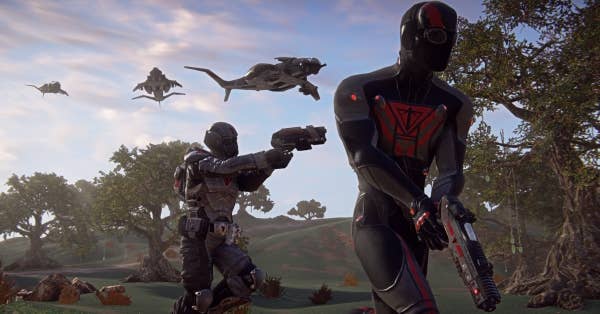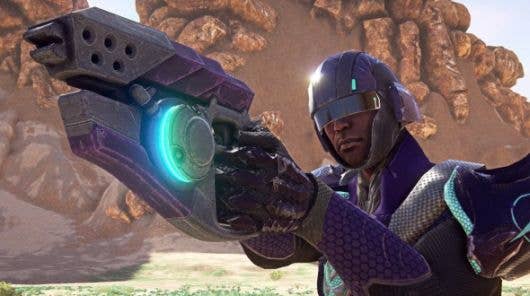Sony Online's Planetside 2: Can It Grab The Call of Duty Audience?
Creative director Matt Higby talks about the challenge of building the game and how "very limited" Call of Duty gameplay is
Back in 2003, during what was arguably its heyday as the premier publisher of online gaming experiences, Sony Online Entertainment released the first MMOFPS, Planetside. Unlike other MMOs, Planetside had real-time FPS combat instead of the point-click play popularized by Everquest. The game also featured a persistent war between three color-coded factions, a marked difference from other instanced multiplayer competitors like Unreal Tournament and Quake 3 Arena.
Now the landscape has changed significantly around SOE, with World of Warcraft still ruling the MMO market after refining Everquest's gameplay for the masses. Mainstream shooters like Call of Duty have added persistent leveling. Free-to-play has allowed new MMO action games like World of Tanks to thrive. Into this market, SOE will be releasing Planetside 2, a free-to-play sequel for the MMOFPS original.
GamesIndustry International sat down with Planetside 2 creative director Matt Higby to talk about bringing the classic title to a brand-new audience weaned on Call of Duty and Battlefield.
From a technical standpoint, building an MMOFPS is one of the most technically difficult projects I've ever had to work with. The amount of technology that's required just to get a thousand people standing in the same room together; let alone being able to shoot at each other from 400 meters away and having have real-time simulated physics for all the vehicles and stuff. It's just an enormous undertaking from a technology standpoint. So, our coders - and those guys are genius heroes to me -they managed to solve all these problems and get it all working.
"I like Call of Duty, I like Battlefield...but they're very limited in terms of the gameplay"
Matt Higby
PlanetSide 2 is a game that we've been wanting to make for a really long time, but we honestly just didn't have the technology to keep up. Now we do. We have a new engine called ForgeLight that we created in-house that takes all of those things that I was just mentioning and basically solves a lot of problems with how they work, how you do network traffic across hundreds of simulated players, all that kind of stuff. So that's the answer to why it's taking so long and the answer to what the technical problems are. And they're vast.

For the game itself, we're focused primarily on PC. But we have made plans and we've talked a bunch about how we're planning on externalizing tons of data. So, every piece of data about the game is gonna get put out via JSON feeds and via XML feeds. So all those app makers and people who are making web apps and stuff are gonna be able to make tools for PlanetSide 2, because we're gonna be sure to release every single piece of data. Basically everything. Capture status of the map, what weapons people are using, all that kind of stuff.
We'll leave it to the experts. That's where it really comes down to. It's when you have a big, passionate community, they're gonna be capable of building lots and lots of really cool tools that we wouldn't think of. Or that we might not have time to make. And you'll have groups of people that are working on building apps together, groups of people that are working on building websites together. And that's really what a community's all about. Just being able to let them build the things that matter to them. Let them figure out what sort of tools they want to have. And then whatever we do to support it, we'll do our best, but I think that's a really cool thing. So we are planning on doing iOS apps and things like that via that method.
Yeah, that's something that I definitely worry about. I mean we have one of the most amazing, passionate fanbases that I've ever seen. And it's purely because PlanetSide- if you got bit by the MMOFPS bug when you played PlanetSide, nothing else is gonna scratch that itch. There are no other games out there that work for it, right? Until PlanetSide 2 comes along.
"You have to build the game basically from the ground up to make it work really, really well with free-to-play"
Matt Higby
There are no other MMOFPSs. There are other games that say they're an MMOFPS, but it's a instanced arena game, rather than a true, open-world MMOFPS. There's a huge, passionate, super-enduring, fanatical fanbase. And, yeah, I do worry about disappointing them, because I wanna make a game that they wanna play. I wanna make a game that I wanna play, too.
So, that's one of the reasons that we've been working very closely with them. I interact with people on Twitter all the time. I go on the fansites, the big PlanetSide fansites like PlanetSide Universe. There's a Reddit subreddit for PlanetSide also. So I go on there quite a bit and I read ideas. I talk back and forth. If somebody has a misconception about something I said in an interview, I will always do my best to [explain] the real situation. And sometimes, people will say, "I heard you say this. I hate that. We don't want that. Change it."
And in some instances, we have. I mean, in some cases we've heard feedback from people and we've said, "Okay, this is something that's just not gonna work and the people who know this game the best, they know how to play an MMOFPS." If they don't like it, then we have to take that seriously, you know. It's not just like you have a community of shooter players. Everybody plays a shooter. So their opinions are not as important. We have a group of people who are so specialized in knowing how to play a specific type of game that they're experts. We have to listen to them. We're compelled to hear what their thoughts are. And it's been really nice being able to hear them.
I hope so. I know for a fact we'll get them an experience they can't get in Call of Duty. I like Call of Duty, I like Battlefield. I'm not, you know, being pejorative about it, but they're very... they're very limited in terms of the gameplay. It's awesome and it's fun. But, it doesn't have any meaning to it, or scope to it. In PlanetSide when you capture a base, you own that base until someone comes and takes it back from you. There's a real meaning to the battle that you're doing. And the map doesn't just flip and everybody has to reload the new map when someone wins. It's persistent, it keeps going.
That's a completely unique thing that no other shooter game really has. So, that's absolutely a new experience that Call of Duty people are going to have. As to reaching out to them and getting them to play the game, I think that's just all about delivering a true FPS experience, which is what we're doing. I mean, the majority of the development, if you're working on making an MMOFPS game- most companies would have a real difficult time getting the 'massive' part to work properly.
The massive part, for us, isn't necessarily the hard part. It's definitely very ambitious and very challenging, but the thing that's been really difficult for us - and more difficult than I thought it would be - is getting everything, like the weapons, to feel exactly right. And there's a feeling of a well-balanced weapon in a FPS game that is very difficult to achieve. And it's almost immeasurable what the difference is between a game that doesn't feel right and a game that does. And if you can just get that feeling right, then people will want to play the game.
The Call of Duty players want to play a game where the weapons feel good, where the combat feels snappy, it feels twitchy, it feels exciting, and it feels legitimate. The weapon that I'm firing feels like a weapon. It doesn't feel like some floaty Nerf gun or something. I feel the impact, I hear the sound of the impact. I see the animation from it. We're building our game to follow that also. It would be way easier if we were just making guys running around with lasers and not worrying about that mechanic, but we're spending a ton of time on the weapons. We're spending so much time iterating that gun feeling that I think we will be able to capture those people who are used to playing a triple-A FPS. Because they're not playing a compromised FPS experience when they play PlanetSide 2.
So, we have a system called the Mission System. Pretty simple name, it's not too clever. The Mission System kind of solves a couple of different goals for us. At the easiest level, at the basis level, what it does is it lets us create missions to go do things on the continent to spread players out. I don't want everybody to be fighting at one base, so I'll create some other missions that tell people to go fight over here and over here. And the server can kind of balance people across the battlefield a little bit that way. The next level below that is allowing players to actually create their own missions. So now you have this ability for somebody who's a commander - who's really invested in the game and really interested in the strategy of the game - to create a mission to attack a base because he thinks that it's strategically important for them to own that base. Then there's this big group of people over here who just don't give a shit about any of that stuff. They only care about having a kick-ass FPS experience. They want to jump in and play it immediately. The Mission System bridges the gap between those two players by letting him create the mission and then letting these guys log-in and just quickly go to the map and say "I want to play this. I want to play right here, right now." They click it and off they go.
Now they're solving these problems, they're out there helping accomplish these margin goals, being part of a huge, important monumental battle. But their barrier to entry was just logging-in to the game and click/go/play. So, really, you have a great system that really helps achieve those two goals and services, those two completely different groups of people within the game.
I think if nothing else that just keeps us honest. You know, if we have nothing to hide, then we have nothing to hide. The thing that I worry about more is people using it to cheat. People using it to figure out enemy movements are on their iOS device, and then being able to go fight against them somehow. But, I'm not too worried about that either, because it's not like that's really giving you an active cheating advantage. It's just letting you know some intel about, "Oh, there's players over here." And ideally, if the ecosystem becomes robust enough then everybody's going to have access to it. Everybody will have the same advantages and disadvantages.

Yeah. I think as a company, we've been moving to free-to-play for quite a while. Free-to-play just works better for both players and developers, I think. So, it's good. I'm a big fan of free-to-play. It's about accessibility.
Oh, there's absolutely a difference. You have to build the game basically from the ground up to make it work really, really well with free-to-play. You can convert games to free-to-play and we've seen a lot of success with that on games like Everquest 2 , [DC Universe Online]. We've seen a lot of success with that, but I really think that building a game from the ground up with the business model in mind is the best way to make sure that the game that you're building and the business model are compatible with each other. You're making choices that work for both of them. You're not trying to compromise gameplay to make the business model work, and you're not trying to compromise the business model because of gameplay reasons.
So, you'll see a lot of very successful free-to-play games like League of Legends and World of Tanks, built from the ground up with that in mind. Here's how monetization's going to work. All that kind of stuff. We definitely knew what we wanted to do when we started, but we never really let that be something where we said, "Oh, because of our business model, we can't do this thing that we really want."
We tried to figure out all the core gameplay concepts first, then build a business model that worked around it, and then go through making all the other decisions from the start. And now, all the decisions we made are going be aligned with those two things together. So, neither one is compromised for the other.
Yeah. For sure. There's lots of them. I would say pretty much any FPS game that's come out the last three or four years, our team has been playing. We played lots of free-to-play games to figure out what they do right, what they do wrong. I mean, we've looked at League of Legends, World of Tanks. We've looked at Battlefield 3 quite a bit. We've looked at Modern Warfare. We've looked at TF2. So we spend a lot of time looking at lots of games. We take a lot of inspiration from all over the place.

